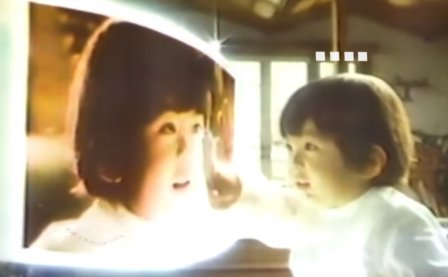And when the hour of his departure drew near—
“Ah,” said the fox, “I shall cry.”
“It is your own fault,” said the little prince. “I never wished you any sort of harm; but you wanted me to tame you…”
“Yes, that is so,” said the fox.
“But now you are going to cry!” said the little prince.
“Yes, that is so,” said the fox.
“Then it has done you no good at all!”
“It has done me good,” said the fox, “because of the color of the wheat fields.”
— Antoine de Saint-Exupéry, The Little Prince
While listening to A flame my love, a frequency, I was sitting cross-legged in a barren room, unpacking boxes full of memories dating back over 20 years. There’s a compulsion repetition in keeping these things — letters, photos, club flyers, scraps of material, soft toys. This kind of work has something of death in it. It combines nostalgia with the repression of the desire for a clean start and with decay — the water damage, mildew, and beetles nibbling slowly but inexorably at the edges of everything that once made up the self.
Let us zoom out now from that entomologically-tinged individual microcosm to a planet still green and blue, stars visible even through smoky skies — but with the presence of the little creatures swarming over it in question, in question their endless repetitive steel and concrete machines for living, and their barren monocultural pastures, spreading across its marble surface like Frankenstein baobabs.
In both cases: is it easier to let it all burn?
Now imagine that flame as a fox pelt.
“The stars will have the last word, and outshine us”
“I beg to differ,” said the red fox…
“Have you forgotten that I, the red fox, made your heart leap with joy?”
– Colleen, “The stars vs creatures”
Saint-Exupéry’s little fox longed to be tamed — an authorial fantasy of animals’ happiness in slavery, but also a commentary on inevitable interdependence, on the way in which the web of relationships, both within and outside the human, involves sorrow and joy that we are destined to enter into and that cannot be extricated one from the other.
But now, we have tamed too much. There is a need for respite.
A respite, a breathing space that A flame my love, a frequency provides. It’s an album that, in its own gentle way, dismantles the Anthropocene (a truistic concept long overdue for deconstruction). It emerges from difficult personal circumstances on the part of Cécile Schott (Colleen) — on the one hand, illness and death in the family; and on the other, a near-miss in the Paris terrorist attacks of November 2015. As a result, writes Schott, death and vulnerability hang over the album, the creation of which served as personal therapy. The press release calls A flame my love… “a meditation on humanity’s ability to prevail,” but although the album expresses positive affect in the light of negative events, it delves so much deeper and wider than that worn cliché of a trajectory, inviting the listener into expanding and contracting gyres more ambiguous and more gorgeous in being thus.
How so? In the current climate (double meaning very much intended), it’s hard not to read A flame my love… as a rumination on endings in relation to nature, as well as endings in death and in emotion. Schott’s lyrics are vignettes reminiscent of the natural fantasies of Tove Jansson, joyful and melancholy in equal part. Stars outshine us, the sun reaches its final hour (whether that refers to twilight or to the unimaginable time five billion years in the future when the sun winks out and what it might shine on then) — but these cosmic reflections mingle with observed details of the natural world, half-anthropomorphised and made Zenlike in their everyday familiarity. Each moment described is an apprehended point in time, where that capture itself inherently creates significance, creates an otherness that is not estrangement. A tamed moment that in being so rewilds the quotidian.
In other words, without being a mere sonic record of actual Is-ness (a field recording), A flame my love, a frequency relays an Is-ness. This is both mono no aware, the sadness of things, but also their joy, and beyond either, the experience of Being. Appropriately for Schott, a bird watcher and naturalist, both the pitilessness and beauty of the natural world just are, beyond the concept of counterpoint, beyond concept itself.
Meanwhile, Schott’s instruments are anything but “natural.” For the first time, she’s abandoned the viola da gamba that was her trademark, as well as the dissonant dubby and acoustic moments of previous album Captain of None (though stars remain).
Rather, on A flame my love…, synthesizer arpeggios twinkle starlike, but they also tear holes in the fabric of reality. They sizzle and hiss, building worlds through the anti-narcissism of small differences. Recursion is a thing of beauty. Reality is fractal. They create a relay system between the natural and the synthetic, swelling like (sine) waves. They drill and deconstruct, in the process rebuilding. They’re discordant, they mingle with Schott’s half-heard voice, which in turn exists somewhere behind the music and then swoops at the surface of consciousness, like the bat in “Summer night song (bat song).” They have a micro-drone quality hidden in the tonalities of notes that do not necessarily hold for the (anti)heroic lengths of, say, an Éliane Radigue, but carry the same emotional freight of gradual transformation that surface listening will not reveal.
These are circuits, and here they join what is beneath with what is above, what is ending with what is yet to come. Where are we? Where will we exist? Will we exist?
“It is possible,” said the fox. “On the Earth one sees all sorts of things.”
“Oh, but this is not on the Earth!” said the little prince.
The fox seemed perplexed, and very curious.
“On another planet?”
“Yes.”
More about: Colleen




